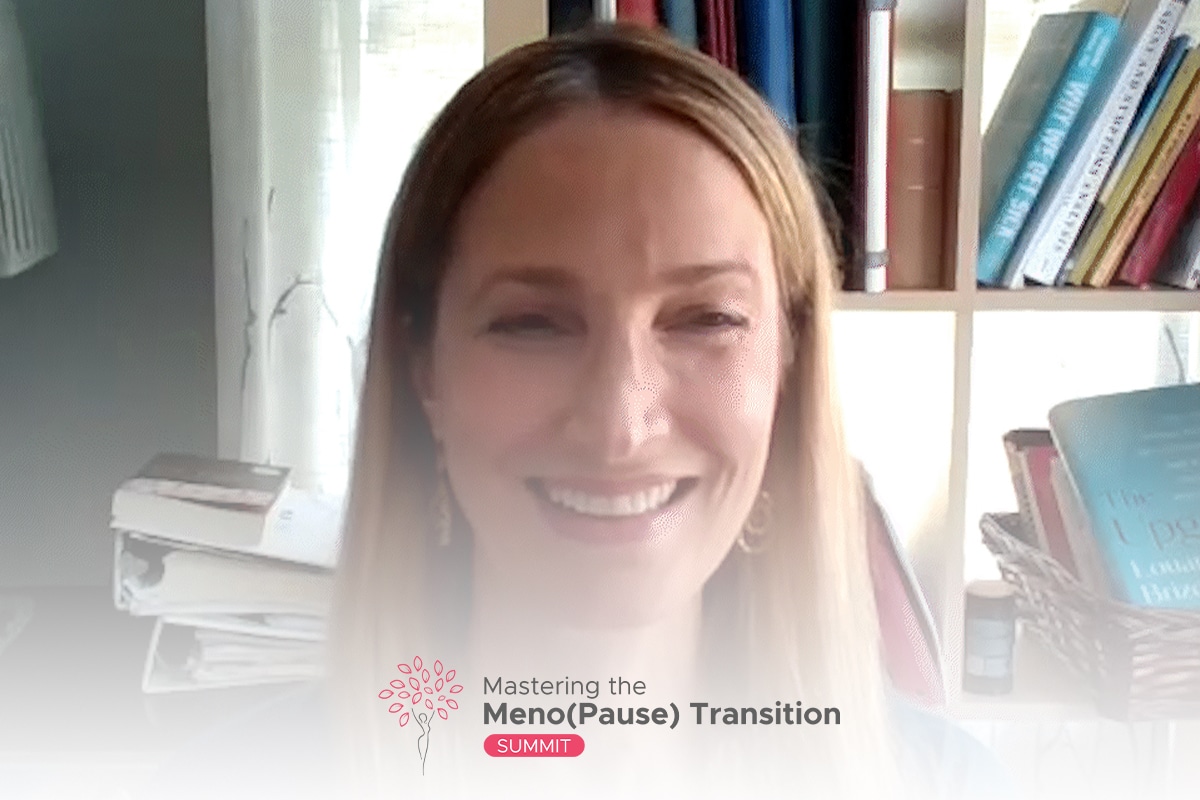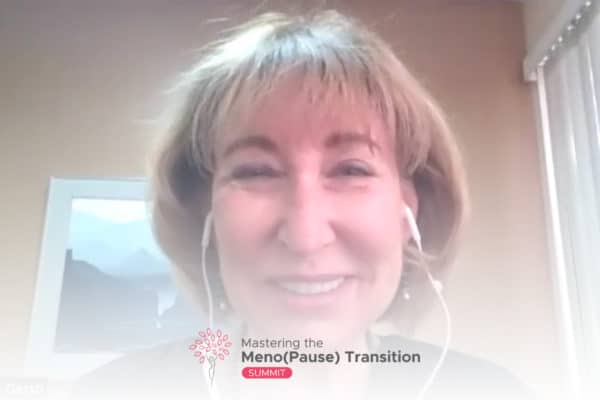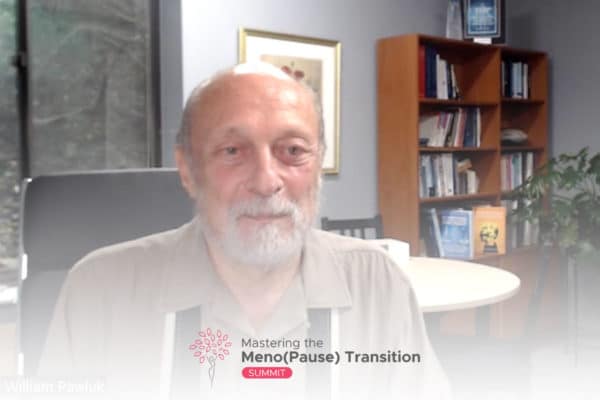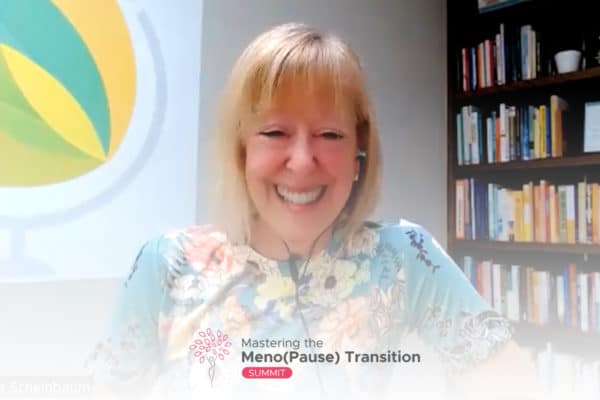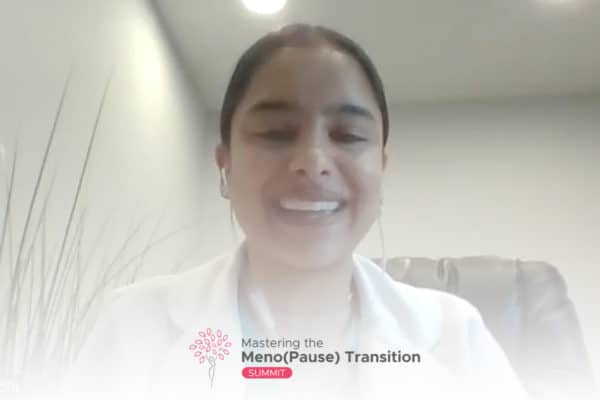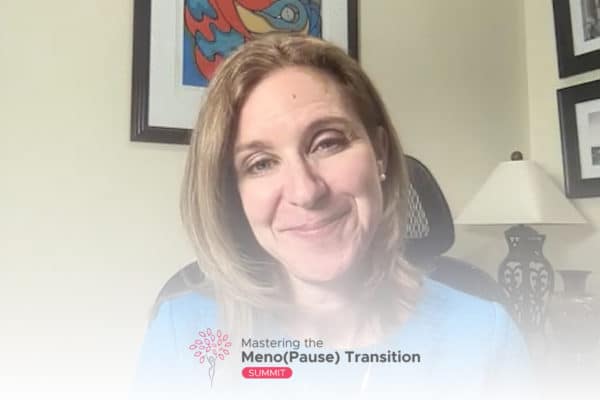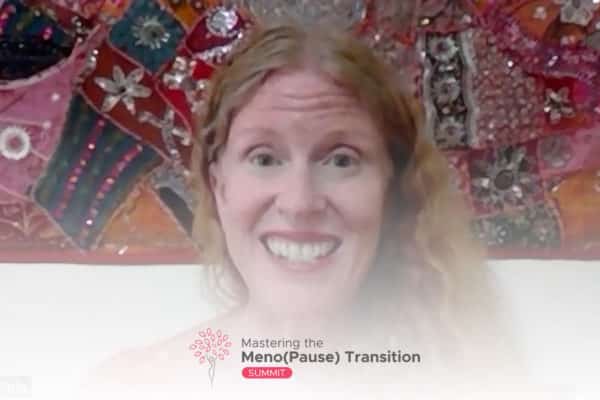Join the discussion below
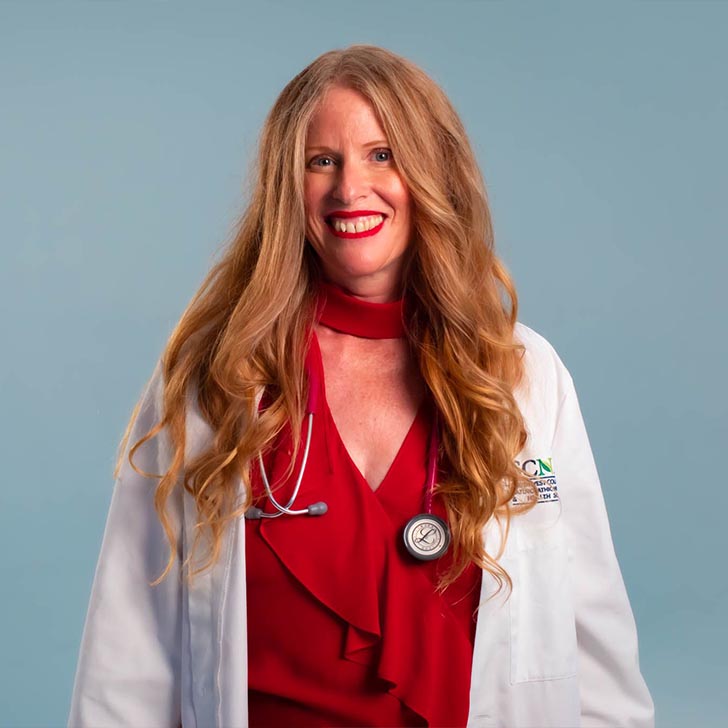
Dr. Sharon Stills, a licensed Naturopathic Medical Doctor with over two decades of dedicated service in transforming women’s health has been a guiding light for perimenopausal and menopausal women, empowering them to reinvent, explore, and rediscover their vitality and zest for life. Her pioneering RED Hot Sexy Meno(pause) Program encapsulates... Read More
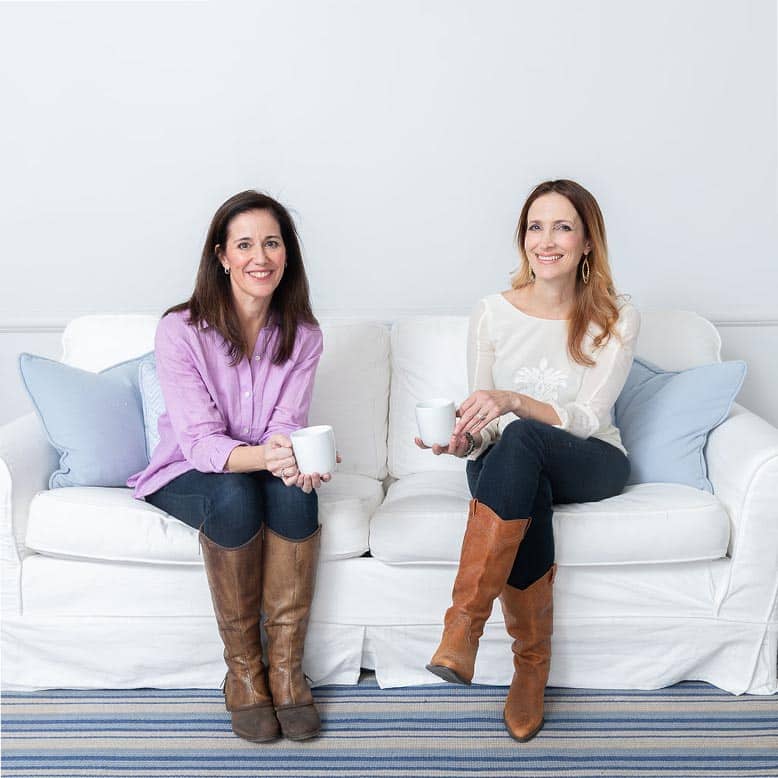
Maria Claps and Kristin Johnson
Maria, an FDN practitioner, and Kristin, an NTP Board Certified in Holistic Nutrition, are plainspoken friends and practitioners who share a passion for women's health, especially women's health at midlife. As both are themselves menopausal, they've refined the art and science of thriving as a midlife woman based on both... Read More
- Aging – loss of muscle mass, shifting body composition, anabolic resistance, increased insulin resistance and inflammation
- Declining Hormones – poor gut health, reduced SM, increased IR and inflammation
- Misguided Interventions to Address Body Composition Change – plant-based + low quality protein, reduced calories, excess
Related Topics
Aging, Aging Gracefully, Aging Process, Anabolic, Anabolic Resistance, Catabolic, Growth, Holistic Health, Hormonal Imbalance, Hormone Replacement Therapy, Hormones, Menopause, Metabolic Health, Midlife Women, Muscle Health, Nutrition, Perimenopause, Psychological Health, Womens HealthDr. Sharon Stills
Hi everyone. I’m Dr. Sharon Stills, your host of the Mastering the Menopause Transition Summit. I’m excited to have you here today and super excited, ’cause this is my first threesome of the summit and I love it because these women that we’re gonna spend some time with and learn from. Before we got online here, we were talking about how they do everything together and they’re joined at the hip and I thought, this is just such a beautiful expression of sisterhood. And that’s such a theme for mastering the menopause transition. We need our community, we need our sisters, we need to rise each other up. And so I love that we’re gonna have this conversation with not one expert today, but two experts. And so the ladies who are joining me are Maria, who is a health coach and Kristin, a board certified nutritionist. And they are plain spoken friends and practitioners who share a passion for women’s health, especially women’s health at midlife. Hello, everyone who’s listening. And so we’re gonna talk about metabolic health. We’re gonna talk about diet and muscles and all these important things to help you have the healthiest vessel, the healthiest body to go through this transition. And so welcome, Kristin and Maria. I’m super excited you’re here.
Maria Claps
Thank you.
Kristin Johnson
Thank you. We are too.
Dr. Sharon Stills
So I always ask everyone before we start, maybe you could each take a turn and just tell us a little bit about your personal journey. How did you end up here? Most of us to have some kind of personal health crisis we experienced or someone in our family experienced and that’s how we got into this line of work. And so I’d love for you to just share with the listeners so we can get to know you each a little better.
Maria Claps
Sure, I was in my early to mid 40s and I was experiencing some perimenopausal symptoms that felt pretty profound to me, sort of like sleep disruption and little bit of weight gain. And I think probably the biggest thing were just mood issues and had always been somewhat holistically minded. So I knew that going to my local doctor wasn’t gonna be the best fit for me ’cause he was a nice guy, but really, really all he did was write prescriptions for people. So I checked into New York City to kind of visit with a quite well known doctor, but didn’t turn out to be a great experience overall because you know, I believe I was 42 or 43 at the time he wanted to put me on bio identical hormones, which I’m not categorically against, but even so I think that was a little bit young for me at that point.
A truckload of supplements, really like a lot of testing. Again, these things weren’t bad, but there was no support. It was like, “Oh well, here’s what’s happening with your estrogen and your progesterone and your cortisol, maybe your insulin too.” And I just, I quit. I just stopped everything, but I knew I was still struggling and I knew there had to be a better way. So it was at that point that I was like, “Oh, I have got to figure this out. Something is happening, something’s eschew.” So I went back to school and then after school I was mentored by several doctors with decades of clinical practice. And so here I am today helping others.
Dr. Sharon Stills
Awesome. And how about you, Kristin?
Kristin Johnson
Yeah so I had, I should say similar timing to my journey, but a different path slightly is that I too was suffering. I think there’s a magical age around 43, 44, where women start to feel the shift palpably. I had everything from the brain fog, the sleep loss, you know, really struggling with just hunger and energy, mood, libido, the whole shebang. And I went to my doctor because intuitively to me this was hormonal and she looked at me and she said, “You’re too young and this has nothing to do with your hormones.” And I said, “Well, could we at least just test them?” And she said, “No.” refuse to test them. So whereas Maria kind of got the kitchen sink thrown at her. I had the entire toolbox kept from me and I was a little bit left to be made to think this was in my head, right. That there was something I was doing to be causing this or that like, this is normal, just suck it up, you’ll get through it, sort of a thing. And I got mad enough finally that I just started digging and trying to figure out my own stuff and worked on.
For me, I brought the nutrition angle to come to bear first and really did move the needle quite a bit, which goes to show that there are interventions that women can be undertaking at this time of life that doesn’t have to include HRT to start. And at one point my husband looked at me and said, “Look at how much improvement you brought to your life. You need to do something for other people with this.” And I’m an attorney by background in training and past profession. And I thought, I don’t have any credentials. I mean, I was in any equals one and I had done a lot of work in research, but that’s where I just finally said fine, I’m going back to school and you know, came out of it with nutrition and was focused kind of in general nutrition. But you start to attract people that are like you and my clients ended up usually being midlife women struggling with a lot of the same issues that I had struggled with. And that’s where the hormone piece became just wildly relevant for me. And then kind of focused everything on that.
Dr. Sharon Stills
And how did you two connect?
Maria Claps
Well, I was doing a training on like midlife hormones and Kristin was initially my student, but now and then I just I was running a program and we just kind of fell in love with each other as it sounds. I just asked her to help me run a program, right? To kind of be a coach assistant, so to speak. And then when that program was over, I was like, “I don’t wanna work without you anymore. Will you marry me now?” I was like, “What do you think, should we kind of join our businesses? I mean really seriously, legally.” So we had a really good attorney who joined our businesses. It was her. Yeah, so that’s her story.
Dr. Sharon Stills
Well, I love it. I love it so much. So let’s talk about you guys talk about the midlife metabolic storm triad. That sounds scary. So let’s break that down for the listeners. What do you mean by that? Is that something that’s happening to every woman as she goes through perimenopause and menopause and what can they do about it?
Kristin Johnson
Yeah, I mean, we kind of have this confluence of events happening and the first one is we all can’t run from it, no matter how much we try, which is aging, right? And so we have these sort of catabolic processes that are result of aging. They’re normal. It’s like I said, we can’t outrun them, we can try and mitigate them. The second kind of piece of the triad is going to be defining hormones. Again, something there is not a woman on this earth that’s going to outrun declining hormones. It happens to all of us, different times of life. Sure, but it’s gonna happen. And then unfortunately, we sort of have this common thread amongst women is that we start to intervene on our own behalf.
And usually the interventions that we take are a little misguided. And so we exacerbate the results of these declining, you know, catabolic issues and the declining hormones. So that’s the sort of metabolic triad that we see is that we’ve got aging hormones and then some misguided attempts to address them. And it results in a really significant metabolic storm. And that’s it’s starting to put women’s health at risk and we just wanna be loud and proud about it because we do have influence over these things. And I think a lot of women think it’s happening to them and you know, we do play a role in our own health. And so we wanna give women a little bit more agency about that.
Dr. Sharon Stills
Hmm, I love that because that is so true. And just such a good reminder that I totally don’t like the word antiaging and a lot of people think-
Kristin Johnson
We are with you.
Dr. Sharon Stills
A lot of people say, “Oh, you’re an antiaging physician, Dr. Stills.” And I’m like, “I am pro aging. I am pro graceful aging. I am Pro health” and so it is, I love that you bring that up just to start that this is something that’s happening, it’s part of life. And when we try and run or resist, we just get into problems rather than going with the flow and enjoying it. And sounds like you’re gonna tell us ways we can do this and be healthy and take control and be empowered and aging. I always say, it’s a privilege and it’s a gift and it’s something we can enjoy. And I truly feel better every year. Aging just keeps happening and I just keep feeling better, ’cause I feel like I learn more, I embrace more. And so I wanna flip the script and not have aging be a scary process. It’s actually a very beautiful one.
Kristin Johnson
Yeah, we agree. I mean, Maria and I say all the time, “I wouldn’t go back to my thirties.”
Dr. Sharon Stills
Oh God, no.
Kristin Johnson
No, nothing. I mean, I love my 50s right now and I plan on loving my 60s and I know Maria’s the same. And we look at this as, you know, it’s not an inevitability that we all have to be miserable just because we kind of turn the page on the five zero, so.
Dr. Sharon Stills
Exactly, so you mentioned the word catabolic and I’m just thinking if you could just describe ’cause there might be some people listening, thinking cata what, and what is that? So could you describe the difference between catabolic and anabolic and how it impacts us and what women can do for that whole process?
Kristin Johnson
Sure, so catabolic if you think of catabolic is breaking things down, anabolic is growth. Catabolic is to kind of reduce and break things down. And you know, as we age, we start losing some of our sort of central nervous system inputs to the body. We start seeing changes in growth hormone, IGF-1, so different hormones and molecules in the body that just naturally decline with aging. We also develop what’s called anabolic resistance, which is that our ability to exert growth mechanisms and inputs on certain things, particularly muscle starts to become harder. So we like to say that something that you could do in your 30s, you almost need to do twice as much in your 50s, that’s anabolic resistance. So we have those catabolic stimuli happening with aging and then Maria can go into the hormonal piece because that starts to layer on top of it and magnifies it.
Maria Claps
Absolutely. So we are declining in hormones in perimenopause, as much as people want to say, oh, well, you know, per menopausal women tend to be estrogen dominant. Okay, we’ll give you that. It’s really temporary. Okay. And so that just means that you didn’t ovulate and if you had a kind of a spike of estrogen that month from the brain directing the ovaries to do that and you didn’t ovulate. Yeah, you have a little bit more estrogen, but you know what, it’s temporary. It is essentially in decline, even though you might be estrogen dominant, we don’t love that term, Sharon. So, yeah. So, and when we lose those hormones, we lose just total metabolic homeostasis. So we do not have to-
Kristin Johnson
Exactly,
Maria Claps
Yeah.
Dr. Sharon Stills
And it triggers into rhythm, I think estrogen is like a rollercoaster at that point. And so maybe it seems like you’re dominant ’cause you’re up at the top, but you’re just about to go down the rollercoaster. So it’s not lasting long.
Maria Claps
Right.
Dr. Sharon Stills
Yeah. So muscle there’s so much talk nowadays about muscle and muscle being the organ of longevity and how it’s so important for us to have muscle. And so what do you ladies have to say about muscle? How is it affected? What should you be doing? What are your best muscle advice?
Kristin Johnson
Yeah, I mean, I think what people don’t appreciate about muscle, ’cause it is something to be appreciated. If we’re honest, is that muscle is this huge sink for glucose disposal. And it’s a very much overlooked thing. We think of muscle, we think of locomotion, we think of functional abilities, right. Being able to sit down in a chair or pick up a-
Maria Claps
Or looking good.
Kristin Johnson
Exactly.
Maria Claps
Lets be honest, like a lot of us wanna focus on looking good, which is okay, but we like to go deeper than that.
Kristin Johnson
Right, right. So it is fulfilling sort of a metabolic role for you. Well beyond your function and your appearance. And that’s the piece that we think people are missing in how to appreciate muscle. So muscle regulates your metabolism. It regulates your insulin sensitivity because it is this big disposal sink for glucose. It regulates inflammation, so we release things called cytokines and cytokines can be either inflammatory or anti-inflammatory in the body, depending on the organ that releases them and the organ of muscle releases anti-inflammatory cytokines. So and then we also have, I mean, muscle regulating immune system function because there’s certain amino acids that serve as co factors for different antioxidant production and whatnot. So if you think about muscle in that way, right, is this organ that has these implications when we lose muscle due to aging, which again is normal. There’s a certain loss of the quantity of muscle. We lose those three factors. We lose that glucose disposal sink.
We lose that inflammatory control, and we lose that immune system function modulator. So that piece of it becomes even to us more relevant than the physique and the function piece. Aging’s also gonna affect the function. We see this huge switch from kind of your fast twitch type two muscle fibers start shifting to slow twitch. And so I should say, yeah, yeah. type two to type one fibers. The fibers of our muscles actually become shorter and thinner as well. So that means you’re losing function on top of quantity. And those things combined for this is why it’s harder to bend over and pick something up. You know, why we might not sprint across the lawn after our dog or something. And so while we can all appreciate those functional impairments and shifts, we need to understand those chemical modulators that muscle provides. And then there’s the loss of hormones also affects muscle. Maria can talk about that. I mean, that’s a huge piece that sort of amplifies this for women in particular.
Maria Claps
Loss of hormones is really, I don’t know if I wanna say it’s the root cause, but it’s a major, it’s sort of like that neuroendocrine theory of aging is thinking that we age because we lose hormones. So whether or not we age because we lose hormones or we lose hormones because we’re aging, I think is irrelevant. But the fact of the matter is that the loss of hormones is really going to, it’s gonna be very impactful and there’s many reasons why, but the one that I like to focus on is when we are in a low estrogen state, that’s an inflammatory state, okay. And so then we’re losing some muscle mass and we are inflamed. And what happens, Sharon, is that a lot of people take either misguided interventions. They’ll like cut calories, right? They will not nourish themselves. They’ll go largely, if not exclusively plant based, plants are not bad, but they displace protein, okay. And the protein that we want women to get is going to be it has to be animal protein. They have to get some animal protein, a good amount into their diet. And that is to kind of help with the processes of inflammation that are going on due to the low hormones. So that that’s one of the things that maybe I jumped ahead of it, but.
Dr. Sharon Stills
No, I mean-
Kristin Johnson
I was gonna say too, that if the insulin piece is huge. And Maria, I know just, would’ve mentioned that we lose our ability to handle carbohydrates as we lose estrogen, we just talked about, we lose our insulin sensitivity as we lose muscle. So now we have this like huge sort of insulin resistance setup. And like Maria just said, the women then will intervene and actually make it worse. And we have this sort of insulin sensitivity loss be getting more insulin sensitivity loss that in and of itself is an inflammatory process. Now add on the inflammation from the low hormones and inflammation breaks down muscle. So it just becomes a super vicious cycle. And then women take matters into their own hands in ways that need to be stopped.
Dr. Sharon Stills
We’re really learning on here that restricting calories over-exercising, things that we’ve been taught are not really what we need to be doing to nourish ourselves at this point. So what do you ladies recommend for the women listening? What are things that are guided, not misguided that they can be doing to help themselves as this is going on?
Maria Claps
Well, I’ll grab the first one and that is they have to lower their carbohydrate intake. And in some cases, Sharon, that might even be like healthy carbs, like sweet potatoes and black beans because of a couple of reasons. So Kristin alluded to the first one, which is if you are low in estrogen and let’s just assume that you you’re perimenopausal, you’re gonna be low in estrogen. If you’re not low in estrogen, it will be eventually, you can handle the glucose, okay. So that that’s a big deal. And then the second reason is that it just displaces protein. So where again, we’re not anti-plants. What we are is saying, hey, go have a big salad and just like throw a little bit of chicken on that because yeah, we know salad is wonderful, we both eat it, but you know, you’ll get full from that, right, because of the fiber.
And again, we’re not saying fiber’s bad, you need some, you don’t need as much as maybe some people promote, but then you’re stretched, you’re full, you’re bloated. And oh, I can’t eat anymore. But meanwhile, you had maybe just a couple of ounces of chicken. So women have to be careful not to go largely plant based because it will displace protein, dense animal protein, which is very helpful if you’re doing appropriate strength training to build muscle and without that animal protein, you’re not gonna build muscle. And without the muscle, you’re not gonna have the sink for glucose when you do have that birthday cake, because no one’s saying we have to be perfect, but we do have to eat really well, I don’t know, 80, 90% of the times or more.
Kristin Johnson
Yeah. And I think the other piece of it is then training. And a lot of women they’re intimidated by the gym. We get it. A lot of women have a misguided notion that they’re gonna become bulky. Ladies, we are here to tell you that in a state of estrogen decline, IGF-1 and growth hormone decline, you are not going to get bulky unless you’re doping, you do not have the chemicals in your body to become bulky. So what we want women to do is not just eat for muscle, but also train for muscle because we talked about those slow twitch, excuse me, slow twitch to fast twitch fiber change. We wanna try and head that off. We wanna head off the loss of quantity as well as loss of kind of quality of muscle. The only way to do that is to provide the substrate, which is eat the animal protein and then stress the muscle, create the kind of animalism, the moment of growth.
And that is not your Peloton, that is not Orangetheory fitness, that is not taking walks every day. That is stressing your muscle by lifting heavy things with slow movements. It’s also not gonna be those group fitness classes where you have five-pound dumbbells and you’re doing sets of 20 arm curls or something. We need women to be working out with the aim of increasing their muscle. And again, if nobody heard it the first time, you’re not going to get bulky, it’s impossible because that is just not how we are chemically made up at this stage of life. So the training piece becomes huge too. Women don’t wanna do it. They’re intimidated. They don’t know how. And so we say, get in the gym, hire a trainer. You know, just find someone who can guide you through this, doing it on your own is not gonna work. Cherry picking videos off of YouTube is not gonna work. It needs to be a very progressive sort of planned, programmed training regimen that takes advantage of that animal protein you’re eating and creates muscle from it.
Dr. Sharon Stills
So what do you consider heavy like pound-wise? You said not five pounds. So what do you think women should be thinking about working up to?
Kristin Johnson
Yeah, I think if they are lifting in sets of 8 to 10 max where they are starting to reach failure by their third set. So I tend to more like 5 to 8, 8 to 10, 8 to 12, depending on the muscle that I’m working, let’s say the glutes and the hamstrings, the lower body, those should be you’re lifting heavy enough that you’re only doing five to eight reps in a set. And you’re usually starting to fail by the end of the third set, that’s heavy. And most women aren’t doing that. And trust me, we don’t want women going and doing that straight away in terms of thinking, they need to be throwing a barbell on their back and doing this. You need to work up to that. And so if someone’s been out of the gym it’s very individual, they need to hire a trainer, learn good form, understand their biomechanics. How’s their hip range of motion. You know, how’s their knee range of motion. It’s a slow process, and unfortunately it’s one that requires a lot of persistence and a lot of consistency. It’s not going to be an overnight transformation.
And this is where social media drives Maria and me absolutely bonkers is women are they’re doing these fitspo things and they’re showing their bodies and they’re doing the befores and the afters, what people aren’t realizing when they’re seeing that is that was four days a week, an hour a day, in the gym for months. And we’re talking 9, 12, 18 months before you start seeing these improvements. But a little bit of time now starts to lock in that it’s 70, you’re lifting that grand baby up over your head, right? That you don’t need help getting the groceries in the car. Like that’s what we’re talking about. It’s not about that fitspo that you see on Instagram, this is about just really improving your health and your metabolic function and locking in all these great interventions that you’ve done.
Dr. Sharon Stills
Such a important thing for everyone listening that we haven’t really touched on yet, but that yes, social media can be fantastic and fun and educational, but it can also be very misguided. And so can be comparing yourself to yourself is a really good place to start. And also to get a trainer that this is we need, like you said, when you set up your business, you needed an attorney. You happen to be one, but we need to be okay, hiring professionals. You know, people come see me ’cause I’m a physician and they want guidance with their health and the same goes for training. It’s not something we should just take on upon ourselves, ’cause there’s a good chance we’re gonna have poor form.
We’re gonna injure ourselves. And then we’re gonna think training doesn’t work and then it’s all over. And so taking the time and investment money-wise, time-wise to get a trainer and maybe it’s not something you need forever, but just to get you started and to make sure you know what you’re doing and you’re doing it safely. I think that’s such important. So two big take home mindset, like you need to have a trainer, you need to have know someone’s doing and you need to not be comparing yourself to these false before and afters. And that ends up making you feel bad. So two really important points. And you also talked about protein. So I’d love to hear your thoughts on what do you like for protein? Do you have a goal for the women listening of how much protein they should be eating? Does it need to be divided doses just a little bit on that?
Maria Claps
Well, I’ll start with that. We really like women to nail down that first meal of the day. That is the most important thing they can do for energy and satiety and craving management for the entire remainder of the day. And in fact, if they don’t get the required amount of protein and we’ll just start by saying 30 grams, it has minimum actually. And sometimes 40 to 50 could even be better, but it has to be a minimum of 30. So Sharon, when we see dieticians and coaches and trainers saying, yeah, get you just get your 20 to 30 grams of protein. And you know, that’s pretty common. Like that’s just not enough. It’s just not. So we would switch 20 to 30, to 30, to 40. And so that nailing, that first meal is critical. If you don’t, you’ll play catch up for the rest of the day. And that catch up is not usually protein. It usually tends to be just like sweets and treats and carbs because you’re just off if you don’t nail that first meal. And as far as like a favorite protein source, I think I can speak for both of us. We just love red meat, eh, we said it.
Dr. Sharon Stills
Hey, my brand is red. And so red meat is part of my brand.
Kristin Johnson
That’s great.
Maria Claps
We just love beef, beef, bison. Yeah.
Kristin Johnson
Yeah, yeah. I think, Maria was spot on and one of the things that a lot of women will lie to themselves and think, well, I’m getting 30, but 15 grams of it is from collagen and their coffee and collagen is not a complete protein, ladies. It does not count towards your protein goals for the day. So what we’ll see is a woman will say, she’ll have her coffee and a scoop of collagen and two eggs. The two eggs are six grams each. So that’s 12 grams of protein and that collagen might be 15 to 20 and they’ll go, voila, I got my 30 and we’re saying, Nope, you’re not even halfway there. The only thing that counts is those eggs. And so once women start to realize that remove the collagen or kind of stakes over shakes girls, as we like to say it as eat your protein, not drink your protein and nailing that first meal that’s key. But then we do kind of want this distribution across the day. That’s somewhat even, okay. So a lot of women, they do this very kind of tilted consumption of protein, little bit of breakfast, little bit at lunch, maybe that tiny piece of salmon or chicken with their biggest salad. And then they’ll kind of nail it at dinner.
It’s too late at this point, you have not set your body up to thrive and be nourished and you will be having energy changes and whatnot. So we say, you know, breakfast like a queen, lunch like a prince, and dinner like a popper. If you wanna look at it that way in terms of calories, but the protein’s the same. So 30 grams is a minimum threshold in order to reach what we call the leucine threshold, which triggers muscle protein synthesis, but a super easy way for women to look at it is a gram of protein per pound of their ideal body weight. So if you wanted to be 150 pounds, 150 grams of protein divide that between three meals, that’s 50 each. That might be a big ask for some women. So we’ll say sure, use that afternoon to have a little protein shake or yogurt stirred up with some weigh protein or something that’s sort of a bridge. But at least 30 of those meals and then your total during the day is gonna be that kind of targeted weight that you wanna be.
Dr. Sharon Stills
So I have two questions. So for breakfast, ’cause I was just laughing ’cause I have a handout that I always given to patients for 20 years with the eat breakfast like a queen, and lunch like a princess, and be poor at dinner and don’t really eat… And so what do you recommend? So if the two eggs is only a fraction of the… What do your breakfasts look like? Just to give the ladies listening some ideas?
Maria Claps
Well, so I will kind of change throughout the course of a year, but what I’ve been having is so a shake in and of itself almost always does not fill me up. Like I wanna be really satiated to the point where I don’t have to think about food for another five hours. Like if I have to have a mid-morning snack, which is almost never, I’m gonna be kind of pissed off. It’s just annoying to me. I don’t. Yeah. It’s just because I’ve not balanced my blood sugar, if that’s the case, if I’m having a mid morning snack. So, but because we’re more in the summer now I’m gonna have a shake, but I’m gonna have a little something with that. That’s gonna be like a little cottage cheese on the side or say two eggs or a little piece of salmon or Arctic char. And man, I am like just set for four or five, sometimes six hours easily. So, but I mean, I will like in the winter, I’ll have a steak for breakfast, I mean, steak and eggs is classic.
Dr. Sharon Stills
I have always taught patients, eat your dinner for breakfast and-
Maria Claps
Totally.
Dr. Sharon Stills
They always look at me like I have seven heads and five eyes and I’m like just, I know it sounds weird.
Maria Claps
It’s amazing.
Dr. Sharon Stills
They always come back and they’re like, “I thought it was so weird, but oh my God, I love this.”
Maria Claps
It’s life changing, really.
Dr. Sharon Stills
It’s a big, big deal. And how about you Kristin? What’s breakfast look like for you?
Kristin Johnson
Yeah, I’m often a dinner for breakfast, whatever leftovers we have, especially I live in a house with all men as Maria does. And so if they’re good leftovers in the kitchen, you gotta claim them early. That’s just the reality. So I’ll usually have those for breakfast. Like I made a kind of taco pie the other day that was like eggs and cheese kind of poured on top of a meat mixture of meat and veggies and whatnot. And I had that with some yogurt and some beef protein stirred into the yogurt. So I mean, my breakfast is normally 50 to 80 grams protein a day and it’s not a lot of volume and this is what a lot of women think is they think, oh my Lord, I have to get all of this in.
And it’s gonna be a 12 ounce ribeye for breakfast sort of thing. It does not have to be that way. And this is where, you know, like you said, reimagining what breakfast looks like is kind of the first place to start. But we like to talk about layering proteins, right? So Maria just talked about her cottage cheese and maybe some eggs. You know, it doesn’t all have to come from one source. And I think that starts to help women when they realize, oh, they can kind of have this menagerie of proteins on their plate. It’s more food variety, it’s more pallet pleasing. And you know, you get a wide variety of flavors. So it’s nobody’s telling you, you have to eat at all from one place.
Dr. Sharon Stills
And for the women listening, is there a tool or an app? How do they know how you just rattled off how many grams of protein in an egg? How would someone listening be able to learn that?
Kristin Johnson
Yeah, we recommend, you know, we wanna be conscious that or conscious that disordered eating is a thing that’s very common, unfortunately with midlife women. It’s whether they’ve had a long history of it or a more recent history, they don’t like that micromanagement. And we don’t either, we don’t think that’s great, but there is a certain learning curve that we just all need to kind of take a journey on. And so that’s where we’ll say using an app, like MyFitnessPal or Chronometer, they’re wonderful apps for you to just kind of eat what you normally eat, but log it, right. This isn’t about tracking for limitation standpoint. This is just learning. And so write it down, put it in the app and be like, oh, I didn’t know an egg was only six grams. If I’m gonna get 30 grams, I have to eat five eggs, you know, for women to kind of learn that piece of it.
And then they can start looking at what works for them. And this is where Maria and I were not super fans of these like prescriptive diet plans or here’s a seven day menu to follow. That doesn’t teach a woman anything. And it doesn’t meet a woman where she’s at, right? I’m not in your household, Sharon, I don’t know what your, you know, kitchen looks like or your schedule at 5:00 PM or who else you’re cooking for, what commitments you might have later, et cetera. So we try and get women to see, like, this is something that you do have to put a little skin in the game. You need to kind of learn the process that works for you and teach yourself what does 30 grams look like? What does 40 grams look like? How can I tweak this to even get more? And what you’ll find is that when women start doing this, they start to see, oh my gosh, I felt so much better with that 45 gram protein meal than I did 30, right. And they start to connect the dots. And once we do that, all of a sudden we see that we’re the ones holding the control. It makes it a lot easier to make those changes.
Dr. Sharon Stills
I love that. And what about the scale?
Kristin Johnson
We just wrote a long blog post on this. We did.
Dr. Sharon Stills
Muscle weighs more and so what… Tell us about this blog post you did.
Maria Claps
I’m gonna let Kristin talk about the scale, but I wanna talk about women and weight for a second. And that is that I think we’re just way too focused on the scale and our weight. And Sharon, I truly believe that almost every woman is going to put on a little bit of weight as she ages. You know, we’re just not gonna be that same body that we were at say 30 or 35. And I think we need to come to terms with that. I think, you know, this hyper social media culture that we live in, you know, we’re comparing ourselves to 35 and even 40 year olds. And when you have estrogen in the tank still, you have a metabolic advantage. And even if you are replacing lost estrogen, it is very good. It’s not the same as when it came from your ovaries. So I think we need to learn to accept that our bodies are gonna change. There are gonna be some functional declines of aging. We fully agree with you. Aging is absolutely a blessing, a privilege. Not everyone gets that. But stop trying to look like you’re 30 years old.
Kristin Johnson
Your weight at 30. Yeah. Yeah, I mean the scale piece, it’s such a made up false benchmark. I mean, what does it tell you? Maria and I see very skinny women, or I should say lean women come to us and they have horrific metabolic health. They’re wildly insulin resistant, they’re inflamed, they’re not sleeping. They’ve got a dry vagina and they’re miserable, but their weight I guess matters, right? Or we’ll see women who are very frustrated with themselves. They feel like they’ve got 10 extra pounds on and will pull their metabolic markers and they are rock stars. They have phenomenal insulin sensitivity. They have no inflammation. You know, they’ve got nice curvy boobs and you know, things that indicate that they’ve got some hormonal sufficiency left, these things are important. So what we tell women is ditch the scale. It tells you nothing. If your end point is true metabolic health, scale doesn’t even come into that equation. But if you want to follow progress, if you want to have some knowledge that your interventions are doing something for you, take your measurements, get your favorite pants that you don’t fit into any longer. We call it the type pants test, right. Is go in, try them on put them back on the shelf.
After three, four months of working hard on yourself, try them on again, see how these things fit. The body measurement piece is huge. And we hear all this muscle weighs more than fat. It’s not muscle’s denser and so it takes up more space. It’s, you know, a pound is a pound is a pound, but when you add muscle onto your body, this those scale may go up. And yet your measurements may go down. I shared kind of vulnerably in this blog post that I am 20 pounds heavier today than I was when I was in my 30s and I had felt like I was this rock star. And yet I could kick my 30 year old’s ass right now in the gym. So these things matter, right? Is that pounds doesn’t… And I’m wearing the same clothes, Sharon, the exact same clothes. I got clothes in my closet that are 15 years old, I’m still wearing them. So that scale does not matter. And it is isn’t being said to like appease women’s egos or tell us all to throw at our scales as though we don’t care any longer. You do wanna care about your metabolic health. You just need a different measuring stick and the scale’s not it.
Dr. Sharon Stills
All right. So we’re gonna have a mass exodus of scale throwing out after this call, everyone get ready. It’s gonna be grand.
Kristin Johnson
Yes.
Dr. Sharon Stills
And so to know, for women listening, could you give them maybe a little checklist or some, like, what should they be if they shouldn’t be relying on the scale, which is what we’ve all been taught then are there lab tests they should be asking their physician for? Or what are some of the benchmarks that you like for women to monitor to know that, hey, I’m a metabolic rockstar, even if I am 20 pounds heavier.
Kristin Johnson
Yeah, I mean, I think one of the things we would say, the very first thing should be fasting insulin. This is a number that’s rarely ever pulled. You’ll see glucose on your comprehensive metabolic panel. And a lot of people, doctors they’re like, oh, your glucose looks good. Well, couple things, the standard reference ranges of the labs are not optimal. These are based on standard Americans’ health, which as we all know is quite poor, then looking at, in addition to insulin, looking at measures of inflammation are a huge factor. So things like-
Dr. Sharon Stills
Where do you, I just wanna stop you for a second. Where do you feel the ladies listening? Where do you like to see the insulin level?
Kristin Johnson
Between two and five?
Dr. Sharon Stills
Okay.
Kristin Johnson
Yeah.
Dr. Sharon Stills
So they have an understanding.
Kristin Johnson
Yeah, and that’s gonna be a big ask for a lot of women. They’re gonna realize, oh my gosh, mine is 10. And I think the reference range, what Mary goes up to 24, 25?
Maria Claps
19 or 20.
Kristin Johnson
20, somewhere in there.
Maria Claps
Yeah.
Kristin Johnson
And I hate to break it to anyone, but if you’re in the teens with your insulin, you’re probably pre-diabetic, that’s just the facts. So, and your doctor would probably pat you on the shoulder and say, this looks great. So yes. Knowing the functional ranges or the optimal ranges are really important, but insulin two to five, homocysteine between five and seven, I would say hs-CRP ideally below one. But if you can stay below two, that’s fine too. Vitamin D is a huge modulator of inflammation. A lot of people don’t realize that it’s gotten the big focus on an immune system over the last little bit of years, but vitamin D sufficiency is important, and vitamin D impacts muscle. This is another thing a lot of people don’t realize when vitamin D is low, we actually break down muscle more. So I’m trying to think, Maria, what are some of the other ones that we, I mean, a fractionated lipid panel is huge. We like to look at the quality of people’s lipids. Not just-
Maria Claps
Said right.
Kristin Johnson
Oh yeah. It said right, yep. You know, thyroid health is another big thing. That’s women just seem to feel like failures when their thyroid slows down with age ladies. It’s another fact of life. The thyroid is changing it ages just like your ovaries, but looking at thyroid health, because that does impact your metabolic health as well. It’s kind of another leg of the stool of metabolic health, so to speak. Oxidative stress, so ferritin would be another one we’d look at, but kind of in the context of a full iron panel, we’re seeing women 180, 200 on their ferritin. That’s wildly too high. That can be really inflammatory with the liver. So, you know, keeping it below a 100 would be better. And when women stop menstruating, we lose that sort of monthly blood letting, which keeps our ferritin within an optimal range. So if women are menopausal, it is a number they should be looking at.
Dr. Sharon Stills
Absolutely great. Anything else you wanna add to that, Maria?
Maria Claps
No, I think she covered it.
Dr. Sharon Stills
Cool, and so in closing, just any other tips? It sounds like throwing out your scale, getting your mindset clear, not comparing, getting a guide, getting the protein in, anything else that you wanna leave the ladies with, that they can do?
Maria Claps
Yeah, so we didn’t do a deep dive into this, but I think it would be really prudent to leave it off the table and that is Kristin and I feel that women really need to be solidly educated around their choices when it comes to hormone replacement therapy. More women can do hormone replacement therapy than think that even those that sometimes think they can’t ’cause they have a family history or maybe they have like genetics for blood clotting issues. So we want women to know what their options are and to make an informed decision, whether that’s a yes, I’m gonna do this, no, I’m not. Unfortunately what happens is they go to the doctor that they think are women’s issues and the doctor they trust, which is their GYN, right. Unfortunately, unless that GYN is trained in hormones, they’re gonna usually get bad advice when it comes to that, or yeah. So we feel that women just need to learn what their options are and make an informed decision on that.
Dr. Sharon Stills
Yeah, we have definitely covered this extensively. I mean, I have been practicing over 20 years and I utilize bio identical hormones with women who have active breast cancer, who are recovering from breast cancer, who are-
Maria Claps
I’m happy to hear that.
Dr. Sharon Stills
Breast cancer. And so there’s such confusion around estrogen and there are actually estrogens like Tamoxifen estradiol and estriol that actually are part of a really good comprehensive cancer treatment protocol. So yes, we are pro education here, we are pro understanding the benefits of biodentical hormones and I’m a huge fan, both personally, professionally, and a huge fan of understanding that it’s not just your hormones, it’s all these other things that we are talking about. And that was one of the leading causes for me to want to host this summit, to really educate women that yes, hormones are safe when prescribed by a physician who really understands them and knows how to monitor them. And that it’s not just about your hormones. It’s about the thoughts you think, the foods you eat, the social media accounts you follow or don’t follow.
That it is this mastering this transition is very comprehensive and there’s lots of pieces from gratitude to meditation to sleeping. They’re all equally important. But when you get engaged and you get into it, it’s like, wow! Then you say just what we were saying. I would never wanna go back and be 30. I’m rocking my 50s. I remember rocking my 40s and kind of thinking, wow, 50s. And then you get to your 50s and you’re like, Ooh, well, 50s are pretty cool. So I can only imagine what the 60s and 70s and the 80s are gonna bring. And so I love that you’ve brought that up. Thank you. So well, this has been fun. And do you, I always ask everyone, ’cause everyone’s been so kind and generous and giving free gifts to the listeners. Do you ladies have a free gift you’d like to offer for people to learn more about you and your work?
Maria Claps
We do, it’s called 21 meals for midlife women. Since everyone always needs food ideas and these food ideas are gonna be very protein centric. So that’s what we’re having.
Dr. Sharon Stills
I love it. And I think that’s great because I’m sure when, like you mentioned, when we think about protein, we just, oh, am I just gonna have a big T-bone steak. So I think that’s a wonderful gift. Thank you that women can open up and look at, I love that idea you term layering your proteins. I think that’s super important. And of course, when we’re talking about protein, I always like to remind ladies you’re not just what you eat, you’re what you’re you absorb. And so making sure your hydrochloric acid levels are sufficient because I see so many patients who maybe are eating enough protein, but then when I run their labs, I’m like, “You’re not absorbing it.” And they have low hydrochloric acid and they’re not absorbing their calcium, their B12 and all of these other things.
So just a reminder that absorption is equally as important as what you’re putting in your mouth. So thank you both for being here. I kind of like the whole threesome thing. I feel like style thing. So this is fun and appreciate the work you’re doing for ladies out there in the world. And thanks for taking time to be here with us all today and thanks to everyone. So what are we all gonna do when we put down this interview? We’re gonna go to our bathrooms, we’re gonna get our scales and we’re gonna toss them, and we’re gonna find a pair of pants that we wanna do the pant test with. So I love that we’re gonna the garbagemen of the world and be like, wow, everyone’s thrown out their scales today. So thank you all for being here. Look forward to being back with you very soon.
Kristin Johnson
Thank you.
Maria Claps
Thank you.
Downloads

